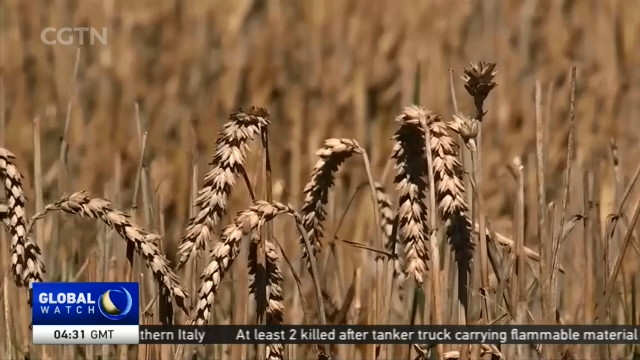
13:39, 07-Aug-2018
Trading Options: Mexico looks to other suppliers for its agricultural imports
Updated
13:28, 10-Aug-2018
03:41

Amid the current global trade conflict begun by U.S. President Donald Trump, America's southern neighbor Mexico is mulling its next moves. Already worried by the uncertain future of NAFTA, the government is motivated even more now to look to other suppliers for its agricultural imports. CGTN's Alasdair Baverstock has our report from Mexico City.
Mexico doesn't produce a lot of flour, but it nevertheless consumes a great deal of bread.
In the capital's wholesale market, its bakers work day and night, with flour imported from the United States, to provide for the population's seemingly insatiable demand.
But with the Mexican government considering import tariffs on wheat as a potential weapon in U.S. President Trump's escalating trade conflict, the industry is worried.
RICARDO GONZALEZ BAKER "The prices of raw materials are going to go up, which means either we have to charge our customers more or use less flour to make the same product. Either way, our clients are less happy than they were, and our business can suffer as a result."
Baker Ricardo Gonzalez and his team use more than two tons of wheat flour every day, all of which is currently imported from the US.
ALASDAIR BAVERSTOCK MEXICO CITY "Mexico is the world's biggest importer of wheat from the United States, but in this unresolved trade conflict, that might be about to change. Buyers here have already started searching for alternative suppliers s a hedge against possible Mexican tariffs on US wheat."
Jose Luis Fuentes is the President of Mexico's wheat millers' union, and says opening up to alternative exporters will be vital for the industry's smooth sailing.
JOSE LUIS FUENTES, PRESIDENT CANIMOLT WHEAT MILLER'S UNION "Obviously the easiest trade is with the United States, as we share a five-thousand kilometer land border. But what these tariffs will do is make other wheat-producing countries more competitive, and therefore a more attractive option when it comes to price and quality. That's why we are opening up to the world."
Market diversification is in fact, already underway. Last December, Mexico imported a pilot shipment of thirty-thousand tons of tariff-free Argentinian wheat flour - motivated in part over uncertainties in NAFTA, the North American Free Trade Agreement. More than triple that amount is planned this year.
Violeta Rodriguez is an economist, and says that while importing wheat from further away may see the Mexican consumer paying more, there is also a political component to the wheat tariffs under consideration.
VERONICA RODRIGUEZ ECONOMIST "The strategic response by Mexico is twofold. It will hit their economy hard, because of the large amount of wheat Mexico consumes, but secondly, the American farmers who produce wheat in the United States voted heavily in favor of Trump. So by imposing economic difficulties on an important part of his voter base, we will see pressure exerted there too."
As Mexico's bakers brace for possible tariffs, the country's government hopes to see pressure put on President Trump's administration -- not only from international trading partners, but from within the ranks of his supporters at home, to end the global trade conflict he started. Alasdair Baverstock, CGTN, Mexico City.

SITEMAP
Copyright © 2018 CGTN. Beijing ICP prepared NO.16065310-3
Copyright © 2018 CGTN. Beijing ICP prepared NO.16065310-3